Trudy J. Morgan-Cole's Blog, page 11
July 12, 2024
The Calm Place, by Jackie Kirkham
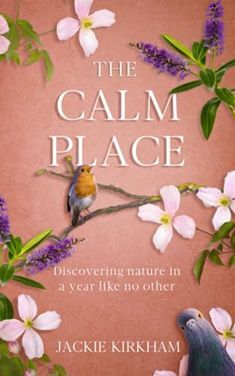
This book had been on my radar for awhile, as I am acquainted with the author online and had seen her post about it. However, I didn’t make the move to buy it until someone challenged me to make a second attempt at reading Annie Dillard’s Pilgrim at Tinker Creek, a book I had attempted before and failed at (more on that in another post). Mired deep in Dillard’s classic, intense, sometimes impenetrably philosophical book about closely observing nature, I remembered that I’d wanted to read A Calm Place, which I judged from what I knew of it would be a much easier, gentler, lighter book about closely observing nature — something a bit more accessible to someone like me, who knows the names of about four flowers and six birds, and can only grow potatoes (with uneven success).
And so it proved to be. I quickly finished and enjoyed A Calm Place; as for Tinker Creek, I’m still ploughing through it. (Can you plough through a creek? Not my best metaphor work). In A Calm Place, Jackie Kirkham decides at the beginning of the year to keep a journal of her observations of a very specific slice of nature — the garden of her urban house in Scotland. As it happens, the year she decides to do this is 2020, and the garden quickly becomes not just an exercise in observation and nature writing, but a retreat (and almost the only retreat available!) from the Covid pandemic and the associated stresses of hospital work, homeschooling, observing politics, and worrying. This was a lovely combination of memoir and nature writing, and as a city-dweller myself, I loved the idea of focusing on the tiny bit of nature right in our back (or front) yards. We don’t necessarily have to escape the city, live off the land, and think deep thoughts in order to learn from the natural world – we can start right were we are, as Kirkham beautifully demonstrates here.
A Short Walk Through a Wide World, by Douglas Westerbeke
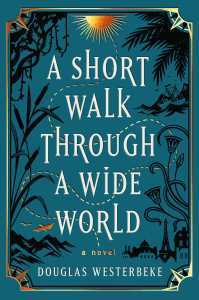
This book has all the ingredients I love — plucky heroine, historical setting, magic/fantasy elements — yet somehow it didn’t add up for me. It was disappointing, because it’s a great concept and I wanted to love it. The story begins in late-19th century France, where an encounter with a mysterious puzzle ball inexplicably leads to nine-year-old Aubry developing a mysterious disorder where she is in danger of bleeding to death if she stays in the same place for more than a few days. Once she figures out what’s happening, Aubry, first with her family and eventually on her own, begins travelling, and spends the rest of her life wandering the world, constantly moving from place to place to escape her fate. There’s also a mysterious underground library! And yet somehow, all these elements didn’t add up to a story that was compelling for me — things just kept happening, but with no strong sense of plot driving the book forward. Also, the storytelling was sometimes non-linear, with events happening out of chronological order — which I’m generally fine with, but in this case it added to my sense of there not being a plot with real cause-and-effect. Maybe this is just one of those books where there’s a disconnect between book and reader – it’s not a bad book by any means; it just wasn’t for me and didn’t live up to my expectations.
June 25, 2024
The Immortalists, by Chloe Benjamin
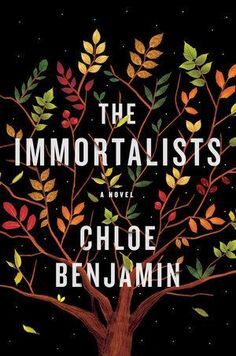
This novel has such a great premise. Four siblings growing up in New York in the 1970s visit a fortune-teller, who tells each of them, privately, the date on which they’re going to die. Then, in four novellas, each sibling’s story is revealed, leading inevitably to the foretold end. We see the weight of knowing your destiny, as well as the impacts of each death on the remaining family members.
And yet … I’d have to say that for me, this book added up to a little less than the sum of its parts. I’m not sure what I was looking for … more of a sense of fate? Less randomness in the outcomes for each character? More of a sense that all these destinies were interconnected? All of that sounds vague, so maybe it’s enough to say that only one of the four was really emotionally engaging to me — the rest made me wonder if the prophecy really mattered, in the end, or if it even needed to. Enjoyable enough while I was reading it, but I don’t think this one has the emotional punch that will make it linger with me.
The Searcher, by Tana French
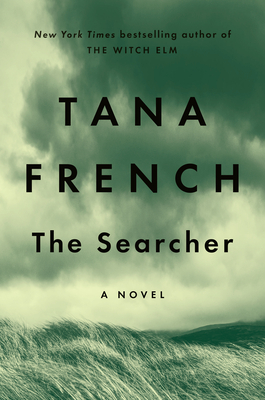
The Searcher is a lovely, brooding, atmospheric mystery about a middle-aged, divorced American police officer who retires the force and buys an abandoned house in a small Irish village hoping for a more peaceful life. Of course, as anyone who’s ever lived in a village anywhere (or read a mystery novel) can tell you, the small town is as rife with secrets, crime, and shame as any big-city block, and despite his determination to keep apart from it all, Cal gets drawn into investigating a missing person that some people would rather stayed missing.
The cynical, divorced, middle-aged male detective who’s seen it all is a trope so well-worn its edges are rounded … and yet Tana French somehow manages to make Cal appealing (to me at least) rather than like a tired old cliche. There’s a basic sincerity and kindness to the man despite the obligatory “gruff exterior,” and the ways in which he’s a little old-fashioned and set in his ways feel believable even if the reader doesn’t always sympathize. I found this really engrossing to read — French is brilliant, I think, at delineating both setting and character with a few well-chosen words — and I will definitely read the sequel as soon as I can pick it up.
Glutton: The Multicourse Life of a Very Greedy Boy, by Ed Gamble
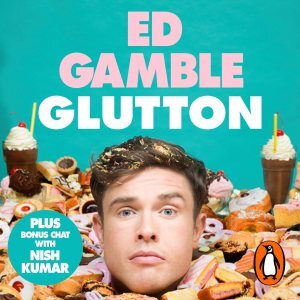
In the genre that you know I’m fond of — UK comedians reading their own memoirs — Ed Gamble’s Glutton is a light, funny, not-too-challenging entry that whiled away several hours for me and Jason as we drove to and from the path of totality during April’s solar eclipse. Gamble, already famous for standup comedy when he teamed up with James Acaster to host the Off Menu podcast, has made his love of food part of his comedic personality. Here he traces that love affair from childhood through adolescence into adulthood. He touches lightly on some of the more serious food-related subjects in his life, like living with Type 1 diabetes, and the way people’s attitudes towards you change when you’ve lost a lot of weight — but his ton is never (pardon the pun) heavy. This is a mostly light-hearted romp through the world of food, drink, and Ed’s relationship with both, and as a fan of his work, I enjoyed listening to it.
June 24, 2024
Eyes in Front When Running, by Willow Kean
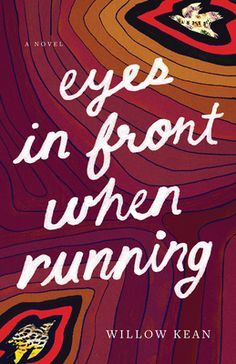
This recent release by local writer Willow Kean is a funny, heartfelt, devastating and hopeful look at a moment of life transition — specifically, the moment in your thirties when all your friends have had, or are having, babies, and people (especially parents and in-laws) are looking at you wondering either subtly or not-subtly if you’ll be next.
Cleo, the main character of this novel, is unsure whether she wants kids, but her longtime boyfriend Jamie is very into the idea and puts some pressure on her to “start trying.” Meanwhile, Jamie’s family is more than a little into the idea, and are quite overt about poking their noses into Cleo’s reproductive business. When things come to a crisis point, Cleo has to evaluate what really matters most to her — and she is confronted with life’s tendency to throw unexpected curve balls that we all have to handle as best we can.
What this brief plot summary doesn’t capture is how witty, thoughtful, and carefully observed this novel is. The small details of life — relationships in your thirties, long-standing friendships, dinner with the in-laws, the geography of downtown St. John’s — are rendered in vivid detail. The minor characters are great, well-rounded and memorable. I’ve said the novel is “witty” but there are also places where, despite the often-serious subject matter, it’s just laugh-out-loud funny. For example, a memorable set-piece in which a young family is bullied by devout Catholic grandparents into dragging their toddler through a baptismal service in church captures the frustration and unintentional hilarity of such moments better than anything I’ve ever read. While this novel was already on my to-read list from the little I knew about it, I was convinced to run out and buy the book after hearing Kean read two short excerpts from it at Sparks Literary Festival, excerpts in which Cleo’s wry, observant, self-deprecating voice leaped off the page and made me want to read the rest.
Eyes in Front When Running is a beautiful example of the kind of literary fiction that can be full of beautiful writing and exquisitely realized moments, while still being vivid, character-driven, and just plain funny — even when the laughter is the kind that is filtered through tears. I highly recommend this novel.
June 21, 2024
To Un-Eat an Elephant, by Cherilyn Christen Clough
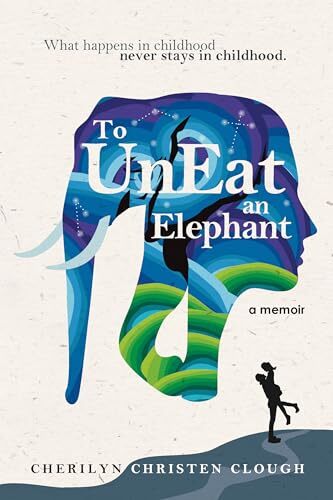
There’s a moment in this book, Cherilyn Christen Clough’s second memoir, where Cherilyn loses her temper at her brother’s girlfriend for describing their family as “dysfunctional.” As anyone who read Clough’s previous memoir, Chasing Eden, already knows, “dysfunctional” is a very apt descriptor that maybe doesn’t go far enough to describe the way in which Clough and her siblings were raised by their ultra-fundamentalist Adventist parents. Her reaction to that word in the context of the story she’s telling alerts the reader not that the brother’s girlfriend is wrong in her assessment, but rather, reminds us of how deeply enmeshed such family dynamics can be. Throughout this memoir, Cherilyn struggles to build an adult life apart from her family, but still feels tied to them by bonds of love, worry, fear, and duty.
To Un-Eat an Elephant picks up where Chasing Eden left off, with young adult Cherilyn leaving home for an Adventist college community — still a pretty conservative and sheltered place in the world’s eyes, but a place of endless possibilities for someone who grew up as the author did. Many memoirs about dysfunctional childhoods and abusive family dynamics end with the narrator breaking free: few take the reader through the next steps of the story. How do you grow up into a healthy, independent adult when your entire childhood has been so tightly controlled? How do you get an education and a career when you’ve never been to school or even properly homeschooled? And how do you strike the balance of maintaining some kind of relationship with parents and siblings you still love, while learning to create healthy boundaries?
Told in simple, straightforward language, this memoir traces that difficult journey. Cherilyn goes to college, gets a job, travels internationally with a Christian music ministry, falls in love and gets married — but becoming her own person is never easy, as she can never fully walk away from her family when she’s had it ingrained in her that she must “forgive and forget” everything they have done. Her unflinching honesty is unsparing: the author never paints herself as perfect, and reveals as many of her own mistakes and she does those of her family members. What emerges is an authentic portrait of someone struggling to emerge from her difficult childhood and discover herself. The memoir ends on a poignant note that alerts the reader that another piece of the story remains untold; I’m looking forward to the next volume.
May 21, 2024
Emperor of Rome: Ruling the Ancient World, by Mary Beard
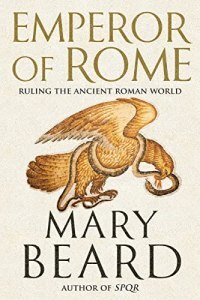
This was an informative and interesting audiobook. Mary Beard doesn’t give us a history of the emperors of Rome in chronological order (that would be interesting too, but this is not that book); rather, she explores what the idea of “emperor” — of one-man rule — meant in Imperial Rome. By examining stories and accounts of the emperors from their own time and soon after — some of which may be more fiction or polemic than fact — as well as archeological evidence, she builds a picture not just of what individual emperors were like, but of how Romans understood the person and the role of the emperor. The book is organized not chronologically but thematically, discussing the emperor’s role in relation to war, to politics, to food, to entertainment, to slavery, etc. It wasn’t quite what I was expecting when I downloaded the book but I did find it well worth reading (or listening to, I guess).
Funny Story, by Emily Henry
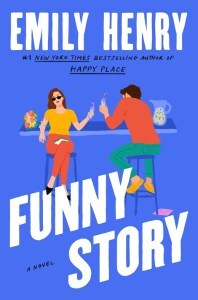
As a writer, an avid reader, and a former English teacher, I’m a HUGE believer in the idea that people should read books they enjoy, and other than that, there are no “shoulds” attached to reading — you shouldn’t read books because you feel they’re Important, or Classics, or Must-Reads, unless you want to.
However, I also do enjoy varying my reading, going back and forth between books that are easy and fun for me to read, and books that challenge me more or push me outside my usual reading comfort zones. Some of the books I find most rewarding are the ones that require a bit more from me as a reader — whether that is intellectually, because the writing itself demands more attention and careful reading, or emotionally, because the subject matter is difficult to read about.
The last two books I read were excellent, brilliantly written books that were challenging on BOTH those levels — Tommy Orange’s Wandering Stars and Jesmyn Ward’s Let Us Descend. Both books delved into difficult and painful histories (and presents); both are highly literary and accomplished writing that demanded my full attention on every page. Both are going to be multiple prize-winners, I’m sure, and I am so glad I read them both.
Following those two, my brain demanded something lighter — well-written, but in a much less demanding way — something guaranteed fun and with a happy ending. For that, there’s no-one better than Emily Henry. I love her light, funny romances that still manage to touch on the deeper reasons why some people struggle to find their happily-ever-after. I almost always love her characters: in this novel the well-organized, buttoned-up librarian Daphne finds her Manic Pixie Dream Guy, Myles, after Daphne’s boyfriend leaves her for Myles’s girlfriend. The premise — they’re thrown together because Daphne needs a place to stay and moves into Myles’s apartment, then pretend they’re dating to avoid looking pathetic to their exes — is as flimsy as most romance-novel conventions, but the journey from there to the ending is fun, sexy, and filled with lots of great secondary characters. Daphne’s story in this novel is not just about falling in love but also about learning how to build good friendships, navigate complicated family relationships, and find community for herself. And, as is almost always the case with an Emily Henry novel, there’s some good book-related content, as Daphne is a children’s librarian who loves her job and thrives in it. Thoroughly enjoyed this one.
Let Us Descend, by Jesmyn Ward
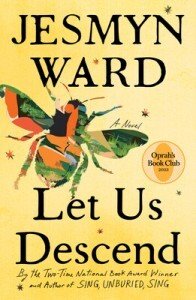
Let Us Descend is a novel that starts out as realistic historical fiction, but when Annis’s mother tells her that there are spirits all around, the reader should pay attention, because those spirits will come to play an essential role later in the story, as the genre shifts more into magic realism.
Annis is an enslaved young girl growing up on the Carolina plantation owned by the man who raped her mother and fathered Annis. As she goes about her work, Annis overhears the lessons being given to her white half-sisters in the big house, and latches onto the lines she hears recited from Dante’s Inferno. Hence the title: Let Us Descend. The novel that makes effective use of a descent-into-hell motif as Annis’s young life, already difficult when we meet her, sinks lower and lower until she experiences the worst conditions possible for an enslaved person — and seeks the help of powers beyond the human realm to try to escape and find freedom. There’s tremendous darkness and evil in this story but also an insistent strain of hope and resilience. Beautifully written, often difficult to read, but well worth the intellectual and emotional investment.



